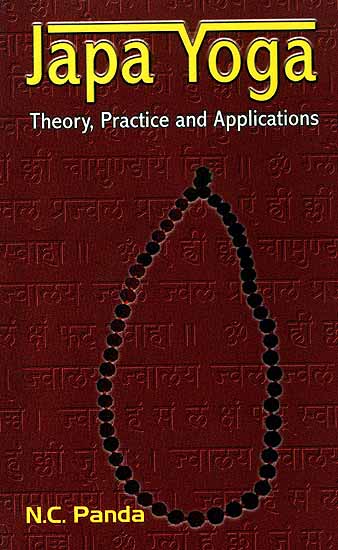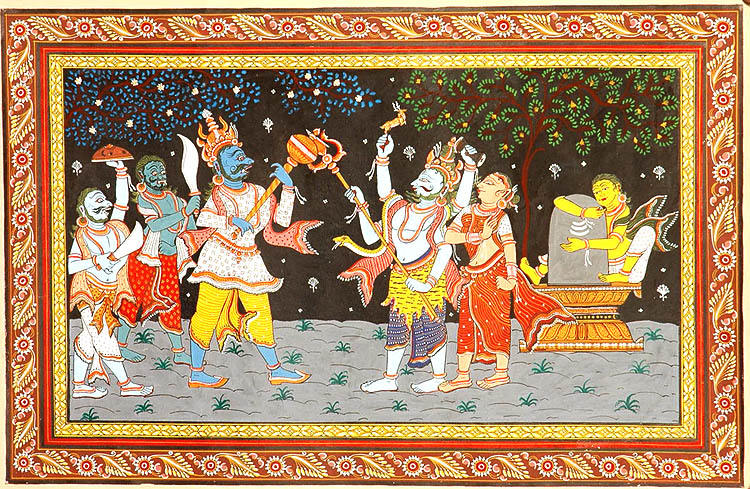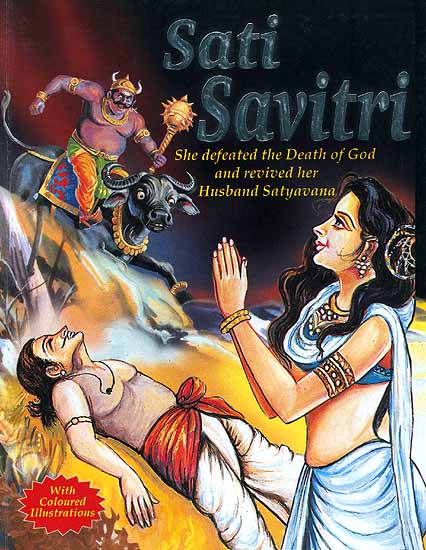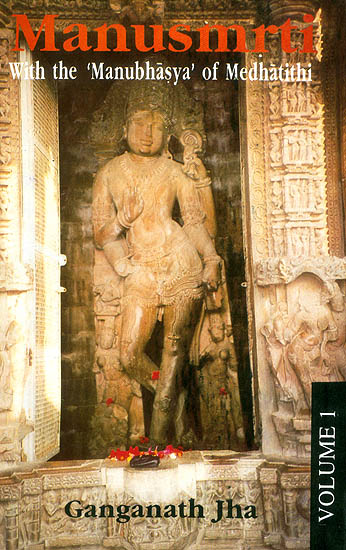exoticindia.es
----- Original Message -----From: Exotic IndiaTo:Sent: Wednesday, June 15, 2011 6:06 PMSubject: Altering Fate: The Transforming Power of Karma
JUNE 2011
ARTICLE OF THE MONTH
Can we alter the fruits of a particular karma through another karma? Certainly. Only the second karma needs to be of the nature of an antidote to the original karma. A good karma can be annulled by a bad karma and a bad one by a good one. Whenever a pleasant situation arises in our life it is due to our punya (meritorious deeds), and whenever there is grief it is due to our sins (paap). The moment there is grief in our lives we want to do something to annul that grief. The karma required for this is known as ‘Prayashchitta’ (atonement). Prayashchitta basically means a prescribed penance for atonement and is made up of the following three components:
1). Chanting (Japa)
2). Charity (Dana)
3). Fasting (Upavasa)
Any atonement differs only in the quality and quantity of these three aspects. One may have to do more fasting or less fasting, do this thing or that thing in charity or do this Japa or that Japa and so on. However, fasting and charity cannot be done by everybody. A diabetic patient or a person with stomach ulcer cannot fast. A poor man cannot give to charity. But there is no such constraint on chanting. The ancient scriptures relax even the rules of Japa to facilitate anybody to do it. If one cannot sit on the floor, he or she can sit on the chair; and if even that is not possible one may lie down and do Japa. Therefore, everyone, for everything – either to get rid of sins, or to acquire merit, should resort to Japa.
Doubt: But many times, even after performing the atonement prescribed in the scriptures and also doing meritorious deeds (punya karma), one does not get rewarded. Sometimes we also hear that whatever is written in our fates cannot be got rid of. It has to be but spent through experience. How can we explain this?
Resolution: What we call as fate is after all the result of our own karma done in previous lives. Of course, we do not know how much or what exactly it is. Nevertheless, it has to be experienced. However, it is possible to rectify it through Prayashchitta. For example, Markandeya who was destined to die at the age of eight overcame it and lived long.
Savitri whose fate had widowhood in store for her, overcame it through her penance.
However, many times common people will not be able to perform that much amount of penance necessary to overcome fate or destiny. The penance may be lacking in its quality or quantity or both. Shri Veda Vyasa says that for the complete result of a karma to manifest itself, the following three are necessary:
a). Concentration of mind
b). Correctness in the performance of karma, and
c). Dana.
Sometimes when we do not succeed, it would be wrong to conclude that destiny cannot be mitigated. Rather it means that we have to step up the quality and quantity of our penance.
Further Doubt: Then how do we understand the statement that whatever is written in destiny cannot be avoided?
Resolution: It works like this: The trouble that one undergoes doing penance itself accounts for the grief to be experienced according to our destiny.
Question: Then which is better – facing destiny as such without any Prayashchitta or experiencing it through the Prayashchitta to overcome our fate?
Answer: It depends upon one’s attitude. People with Vairagya, meaning those who have become disenchanted with material life and want to leave karma to concentrate exclusively on Moksha, are the ones who face whatever is their fate and do not bother to perform any Prayashchitta. This amounts to undergoing pain voluntarily for a higher cause. Therefore, this itself is penance. However, common people should not do this. They have various duties to attend to. Therefore, they should overcome it by doing the penance of Prayashchitta. This will not only mitigate grief but also increase faith in God.
Question: What about serving people in distress? What is its relation to our Prayashchitta?
Answer: Serving people in distress is only a part of Prayashchitta (and not the whole). Any meritorious deed has two parts:
1). Ishta: This aims at the individual good.
2). Purta: This aims at the collective good like feeding people, building houses for them, constructing water tanks etc.
The scriptures narrate a very interesting thing. What should be done as Prayashchitta for atonement of all sins in one stroke? The answer is that one should grow a new forest and stay in it for the rest of one’s life! This implies that destroying a forest amounts to committing all sorts of sins at one go.
Doubt: Doesn’t serving somebody in distress imply interfering with the destiny of the one receiving the service? Will such an interference be right or wrong?
Solution: When somebody is in grief, it is not for us to be discussing his fate. For that matter his fate might be that he has to receive succor from us today, now. And if we give it, it is redress for him and punya for us. Therefore we have to rush to help them to the extent we can. In fact, the great Manu says that the one who neglects people in distress will lose all his penance, if he has any.
Question: What is the difference between destiny and our Samskara?
Answer: Any karma we do has two aspects. One is its fruit which we experience in the form of pleasure or pain. This is our destiny or fate, also known in Sanskrit as ‘Prarabdha.’
The second aspect of karma is the impression that it makes on the mind. The resultant impression of all our karma is Samskara. It is this Samskara which motivates a person to indulge in particular types of actions. Karma ends in us reaping its fruits, while Samskara determines our inclinations. For example, the karma of studying a certain subject not only results in its knowledge, but also creates a desire to study it further. This desire is called Samskara. Whenever there is bad Samskara, it means we have indulged in bad karma. Therefore, one should try to rectify one’s Samskara. Just as our destiny is rectifiable, Samskara is also rectifiable.
An Important Question: What prompts one to take to Prayashchitta? If this prompting is a result of our fate and/or Samskara derived from the previous lives, then we have no control over it. Then what is the meaning of the scriptures in prescribing Prayashchitta?
Resolution: It is not like that. All the mental thoughts which we get can be classified into two groups. One which elevates us in the direction of God and another which drags us towards mundane things. These two continuous flows of thoughts is the inherent feature of our mind. However, this itself is not Samskara. But that which is responsible for restricting the thoughts predominantly in only one direction is Samskara. Mundane Samskara is almost common to everyone. That is why people will be thinking about mundane things only. We do not have to make efforts to think of mundane things. But to turn the thinking to the other direction needs effort. The more precisely we do it, the earlier we change the bad Samskara. This means that though the mind slips towards mundane things, we can and should make efforts to change its course. Therefore, by force, we should develop the habit of reading and listening to only divine literature. We should keep company only with divine people. This effort that has to be put here and now is something that is to be done in spite of our destiny (Prarabdha). That is why the scriptures prescribe rules of conduct. These constitute the most effective way in which we can cultivate this effort. If we don’t make such an effort, we will become more and more mundane, accrue more and more sins and land up in more and more grief.
Question: Most of us are caught up in the mundane world only. What is the process by which very mundane people like us can improve?
Answer: Everyone has to improve in due course. One who has become a slave to mundane things indulges more and more in them. When he does not get material happiness in according with Dharma, he transgresses it and indulges in Adharma. This leads to a worse fate, which in turn results in unbearable grief. Baked in the fire of this grief, somehow he automatically recognizes its connection with mundane things and decides to run away from them.
Karma and Diseases
Doubt: It is common knowledge that our actions in previous lives determine our fate, which in turn determines our health and disease in this present birth. Some people say that the diseases destined in our fate are not rectifiable by medicine, though of course, problems like cold, indigestion etc which can be attributed to present and traceable causes are curable by medicine. How do we identify whether something now is the result of our destiny or the result of present, verifiable causes?
Resolution: The cause of anything, which cannot be traced to an act done wantonly in this life should be deemed as destiny, otherwise it is not. For example, if the cause of a stomachache is traceable to faulty eating done a couple of days earlier, it is not fate, otherwise it is. Thus says the Valmiki Ramayana:
‘What cannot be explained must surely be fate.’ (Ayodhya Kanda 22.20)
Query: Even diseases, for which we don’tfind a traceable cause, are often treated successfully by doctors. How can the patient’s Prarabdha be rectified by the doctor’s karma?
Reply: Through the exorbitant fees the patient pays him!
Doubt: If science can set right even that which is destined to happen, what is the need for the Prayashchitta?
Resolution: Oh no, it does not work like that. In order to go to an appropriate doctor and also for the doctor’s efforts to succeed, the patient need the grace of God. One such instance is as follows:
A young lady in her advanced state of pregnancy once got a severe headache. Her brother, a well-known doctor, gave only mild medicine for fear of impacting her pregnancy. She was not cured. He then brought her to another expert. The same happened with him too. Then someone suggested that praying to a particular temple in a nearby town would help her. The father of the girl immediately did this. Later her brother took her to another doctor. He perchance asked her to open her mouth and noticed a decayed tooth. He advised her to have it removed. When this was done, she was cured without any medicine. Each of us has had many such experiences. Therefore, the idea for going to the appropriate doctor was a divine inspiration, which eventually did her good. This is the way it works.
Conclusion:
Some have speculated that Indian thought is fatalistic, i.e., it believes what is bound to happen will happen, however hard we may try to avert it. Nothing can be far from the truth. In fact, things are just the opposite. We can not only create a better future for ourselves through good karma in the present, but we can also transform the unfavorable effects of previous karma through specified actions delineated in the scriptures.
This article is based almost entirely on the teachings of Param Pujya Swami Paramanand Bharati Ji. However, any error is entirely the author's own.
We hope you have enjoyed reading the article. Any comments or feedback that you may have will be greatly appreciated. Please send your feedback to feedback@exoticindia.com.
This Article by Nitin Kumar
This email is our monthly article on Indian Art, Philospohy, and Religion.
Unsubscribe at any time or Update your Profile.Indian Arts and Crafts LLC
3422 Old Capitol Trail #224
DE 19808 USA
References & Further Reading:
- Bharati, Swami Paramananda. Foundations of Dharma. Bangalore 2008.
- Bharati, Swami Paramananda. Vedanta Prabodh: Varanasi, 2010.
- Srimad Valmiki Ramayana (Sanskrit Text with English Translation), Gorakhpur



TABLA - FUENTES - FONTS
SOUV2
- SOUV2P.TTF - 57 KB
- SOUV2I.TTF - 59 KB
- SOUV2B.TTF - 56 KB
- SOUV2T.TTF - 56 KB
- bai_____.ttf - 46 KB
- babi____.ttf - 47 KB
- bab_____.ttf - 45 KB
- balaram_.ttf - 45 KB
- SCAGRG__.TTF - 73 KB
- SCAGI__.TTF - 71 KB
- SCAGB__.TTF - 68 KB
- inbenr11.ttf - 64 KB
- inbeno11.ttf - 12 KB
- inbeni11.ttf - 12 KB
- inbenb11.ttf - 66 KB
- indevr20.ttf - 53 KB
- Greek font: BibliaLS Normal
- Greek font: BibliaLS Bold
- Greek font: BibliaLS Bold Italic
- Greek font: BibliaLS Italic
- Hebrew font: Ezra SIL
- Hebrew font: Ezra SIL SR
Disculpen las Molestias

EXOTICINDIA.ES
| TEMAS |
HOME - PAGE - PAGINA DE ORIGEN | ||
| OTROS | -- |
Conceptos Hinduistas (1428)SC
Category:Hindu (mythology) (3256)SC | Category:Hindu mythology (3270)SC | Categoría:Mitología hindú (3288)SC (indice) | Categoría:Mitología hindú (videos) (3289)SC | Conceptos Hinduista (A - G) SK y SC (videos) (3294)SC
Aa-Anc · Aga - Ahy · Ai - Akshay · Akshe - Amshum · Ana - Ancie · Ang - Asvayu · Ata - Az · Baa-Baz · Be-Bhak · Bhal-Bu · C · Daa-Daz · De · Dha-Dry · Du-Dy · E · F · Gaa-Gayu · Ge-Gy · Ha-He · Hi-Hy · I · J · K · Ka - Kam · Kan - Khatu · Ki - Ko · Kr - Ku · L · M · N · O · P · R · S · Saa-San · Sap-Shy · Si-Sy · Ta - Te · U · V · Ve-Vy · Y · Z
Aa-Anc · Aga - Ahy · Ai - Akshay · Akshe - Amshum · Ana - Ancie · Ang - Asvayu · Ata - Az · Baa-Baz · Be-Bhak · Bhal-Bu · C · Daa-Daz · De · Dha-Dry · Du-Dy · E · F · Gaa-Gayu · Ge-Gy · Ha-He · Hi-Hy · I · J · K · Ka - Kam · Kan - Khatu · Ki - Ko · Kr - Ku · L · M · N · O · P · R · S · Saa-San · Sap-Shy · Si-Sy · Ta - Te · U · V · Ve-Vy · Y · Z
Conceptos Hinduistas (2919)SK
(2592)SK
Aa-Ag · Ah-Am · Ana-Anc · And-Anu · Ap-Ar · As-Ax · Ay-Az · Baa-Baq · Bar-Baz · Be-Bhak · Bhal-Bhy · Bo-Bu · Bra · Brh-Bry · Bu-Bz · Caa-Caq · Car-Cay · Ce-Cha · Che-Chi · Cho-Chu · Ci-Cn · Co-Cy · Daa-Dan · Dar-Day · De · Dha-Dny · Do-Dy · Ea-Eo · Ep-Ez · Faa-Fy · Gaa-Gaq · Gar-Gaz · Ge-Gn · Go · Gra-Gy · Haa-Haq · Har-Haz · He-Hindk · Hindu-Histo · Ho-Hy · Ia-Iq · Ir-Is · It-Iy · Jaa-Jaq · Jar-Jay · Je-Jn · Jo-Jy · Kaa-Kaq · Kar-Kaz · Ke-Kh · Ko · Kr · Ku - Kz · Laa-Laq · Lar-Lay · Le-Ln · Lo-Ly · Maa-Mag · Mah · Mai-Maj · Mak-Maq · Mar-Maz · Mb-Mn · Mo-Mz · Naa-Naq · Nar-Naz · Nb-Nn · No-Nz · Oa-Oz · Paa-Paq · Par-Paz · Pe-Ph · Po-Py · Raa-Raq · Rar-Raz · Re-Rn · Ro-Ry · Saa-Sam · San-Sar · Sas-Sg · Sha-Shy · Sia-Sil · Sim-Sn · So - Sq · Sr - St · Su-Sz · Taa-Taq · Tar-Tay · Te-Tn · To-Ty · Ua-Uq · Ur-Us · Vaa-Vaq · Var-Vaz · Ve · Vi-Vn · Vo-Vy · Waa-Wi · Wo-Wy · Yaa-Yav · Ye-Yiy · Yo-Yu · Zaa-Zy
Aa-Ag · Ah-Am · Ana-Anc · And-Anu · Ap-Ar · As-Ax · Ay-Az · Baa-Baq · Bar-Baz · Be-Bhak · Bhal-Bhy · Bo-Bu · Bra · Brh-Bry · Bu-Bz · Caa-Caq · Car-Cay · Ce-Cha · Che-Chi · Cho-Chu · Ci-Cn · Co-Cy · Daa-Dan · Dar-Day · De · Dha-Dny · Do-Dy · Ea-Eo · Ep-Ez · Faa-Fy · Gaa-Gaq · Gar-Gaz · Ge-Gn · Go · Gra-Gy · Haa-Haq · Har-Haz · He-Hindk · Hindu-Histo · Ho-Hy · Ia-Iq · Ir-Is · It-Iy · Jaa-Jaq · Jar-Jay · Je-Jn · Jo-Jy · Kaa-Kaq · Kar-Kaz · Ke-Kh · Ko · Kr · Ku - Kz · Laa-Laq · Lar-Lay · Le-Ln · Lo-Ly · Maa-Mag · Mah · Mai-Maj · Mak-Maq · Mar-Maz · Mb-Mn · Mo-Mz · Naa-Naq · Nar-Naz · Nb-Nn · No-Nz · Oa-Oz · Paa-Paq · Par-Paz · Pe-Ph · Po-Py · Raa-Raq · Rar-Raz · Re-Rn · Ro-Ry · Saa-Sam · San-Sar · Sas-Sg · Sha-Shy · Sia-Sil · Sim-Sn · So - Sq · Sr - St · Su-Sz · Taa-Taq · Tar-Tay · Te-Tn · To-Ty · Ua-Uq · Ur-Us · Vaa-Vaq · Var-Vaz · Ve · Vi-Vn · Vo-Vy · Waa-Wi · Wo-Wy · Yaa-Yav · Ye-Yiy · Yo-Yu · Zaa-Zy
GENERAL
JUDAISMO | Ärî Garga-Samhita | Oraciones Selectas al Señor Supremo | Devotees Vaishnavas | Dandavat pranams - All glories to Srila Prabhupada | Hari Katha | Santos Católicos | El Antiguo Egipto I | Archivo Cervantes | Sivananda Yoga | Neale Donald Walsch | SWAMIS | ENCICLOPEDIA - INDICE | DEVOTOS FACEBOOK | EGIPTO - USUARIOS de FLICKR y PICASAWEB | AYUDA en INFORMÁTICA | BIOGRAFIAS | BUDDHISMO | CINEMANÍA | DANDAVAT PRANAMS | DANDAVATS | HEBREO - JUDAISMO | HINDUISMO | KABALEH - CABALA | MAESTROS ESPIRITUALES | MEDICINA NATURAL | Mis Escritos | MITOS Y LEYENDAS - MITOLOGÍAS | Religión | TEXTOS BÍBLICOS | Textos Sagrados Antiguos





![Srimad Valmiki-Ramayana (With Sanskrit Text and English Translation) [Two Volumes]](http://www.exoticindia.com/books/srimad_valmikiramayana_with_sanskrit_text_and_english_idg005.jpg)


No hay comentarios:
Publicar un comentario